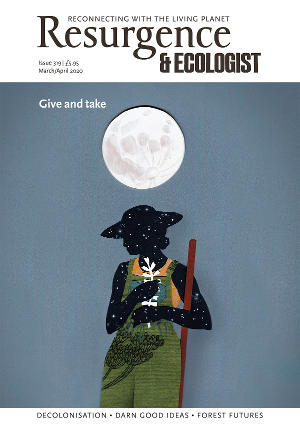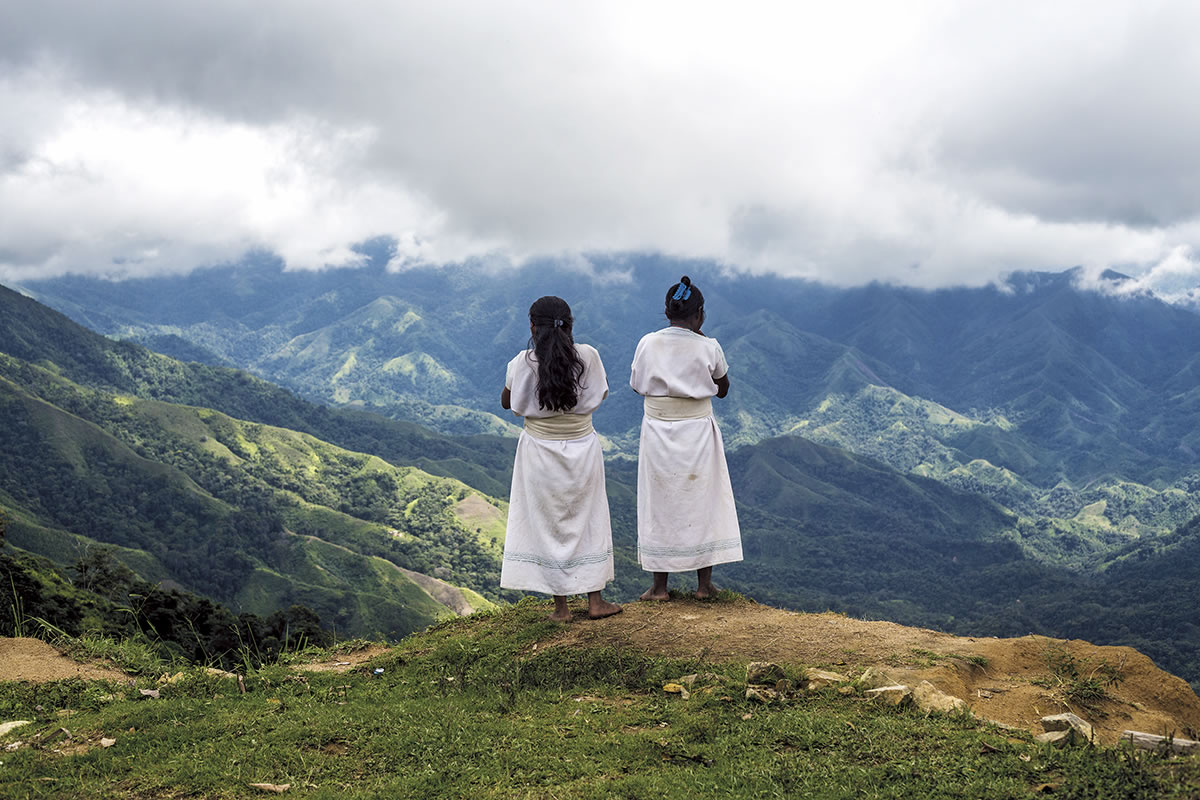Niwi Umukunu (the Sierra Nevada de Santa Marta) is the home of the Arhuaco Indigenous People. Located in the north of Colombia, with mountains 5,000 metres above sea level, Niwi Umukunu feeds and gives life to 45,000 human residents and uncountable nonhuman residents. The Arhuaco see their home as a sacred whole. They consider that the threads of the holy net interconnect all beings inhabiting Mother Earth, and that the wellbeing of the water, the forests, the air, the earth, the food, the humans and the non-human animals are interdependent. The Arhuaco also believe that every planetary inhabitant has a spiritual owner. For instance, Turi’jina is the spiritual father and owner of the birds; Zarin’jumaka is the spiritual father of the mammals.
The mamos and kwimis are the male and female spiritual leaders chosen from among the Arhuaco people. Under their leadership, the Arhuaco people think and act in pursuit of “the quest for balance with Nature and oneself”. The mamos explain that humans must compensate for every harm committed in the material dimension; otherwise, the harm will cause a perturbation of the spiritual order. The disturbance of both orders puts in danger the existence and wellbeing of all the inhabitants of Niwi Umukunu.
To maintain the balance of everything, mamos and kwimis practise the a’buru, a ceremony of gratitude and respect towards Mother Earth – an act of thankfulness for allowing the Arhuaco to survive by relying on other beings. When the Arhuaco kill a non-human animal, or when a person dies, the mamo or kwimi combines the a’buru with the anugwe iwechun, which means withdrawing the spirit from the body of the animal, whether human or non-human. This ceremony intends to prevent any suffering during death and to lead the soul towards its spiritual owner. The Arhuaco holistic approach, which seeks balance and practises gratitude, shapes all their nutritional practices.
The Arhuaco people structure their social life around the fundamental principle of honouring and respecting the sacredness of Nature. Their nutritional practices follow this rule, from food production to its consumption. Each family produces its food in a small farm; they plant a variety of crops such as malanga, beans, cassava and plantain, and keep a few animals – goats, pigs, chickens – depending on the weather. The Arhuaco people perform ceremonies before planting and harvesting their food. The mamo, during the appropriate phase of the moon, does a spiritual preparation for the land, the seeds and the farmers. The farmers plant the seeds before sunrise while still fasting. Afterwards, the mamo commends the seeds to Ukwu, the spiritual mother of the seeds. Once the seeds sprout, the farmers spiritually sanitise them to protect them from insects.
Spiritual nourishment
The diet of the Arhuaco, who perform physically demanding tasks daily, consists mainly of grains and vegetables; they rarely eat meat. The few occasions on which they eat meat are moments of spirituality. Before killing an animal, the mamos request permission from the animal’s spiritual owner, and then they perform the anugwe iwechun. After killing the animal, the community makes an offer in the form of food to repay the animal’s spiritual owner and thus restore the balance in the sacred net.
Food – mainly gwirwa-seygu’nawu (corn) – is essential to nourish the communitarian culture of the Arhuaco people. It is the basis of many ceremonies, including the jwa unkusí (baptism). The jwa unkusí is a month-long spiritual work. Through it, the mamos and kwimis show the baby that the baby must coexist in peace with all the other beings inhabiting Mother Earth.
The Arhuaco food sovereignty revendicates an ancient culture: a way of thinking and living. The inhabitants of Niwi Umukunu always seek to maintain the balance of the sacred net. For them, respect for the spirits of Nature, including those of animals, informs every aspect of life; it is a permanent communitarian effort.
Veganism
The mamos and kwimis consume wildlife; the rest of the community consume farmed animals. Such practices go against the fundamental principle of the western vegan movement. Veganism is a multifaceted project whose core intention is to exclude, as far as is possible and practicable, all forms of exploitation and cruelty to animals. Many vegans reject tradition as a valid reason to kill and exploit animals. Vegans believe that animals have a right to life. A vegan would ask whether permission to kill an animal can in fact be sought, and whether it matters that the community tries to honour the animal’s spirit through other actions. From a vegan perspective, in killing animals Arhuaco practices fail to acknowledge the animal’s right to life.
Yet the fundamental logic behind the ‘new style’ of western veganism – see Tara Garnett’s article Old Versus New in Issue 318 – with its perceived emphasis on consumption rather than animal welfare, contradicts the Arhuaco philosophy. This approach to veganism has developed within a highly individualistic culture. Individualism implies fragmenting the world into many parts: such is a logic opposed to holistic thinking. Such fragmenting philosophy is – for the Arhuaco – the leading cause of imbalance in the sacred net of life. Individualism can cause people to seek to transform the world individually and through nutrition as an isolated practice. The lack of communitarian reliance can cause the individual to cease their efforts to respect Nature via their dietary practices. And that respect for the natural environment might be implemented only in the food realm, neglecting all other daily activities.
How should we react to such a dissonance between Indigenous food sovereignty and veganism that is focused solely on consumption? Rather than concentrating on opposing beliefs, the focus should be on the many shared ideas between the vegan perspective and Arhuaco practices. Due to its history, veganism can lead to a deep respect of Nature – like the one practised by the Arhuaco people. As per its lived principles, the Arhuaco cosmo-vision entails fundamental connection with the spirit of each animal. Indeed, the Arhuaco consumption of meat – which is neither systemic nor systematic – is based on an understanding of the interaction of all beings on this world as a natural fabric: Indigenous people, animals, plants, and so on all have a spiritual life. They must, thus, be free from abuse, but must also contribute to the survival and wellbeing of the others.
Both the Arhuaco and the vegan movement seek a world more respectful of every being inhabiting Mother Earth. That they do it through different means should not equate to conflict; instead, it is an opportunity to learn from each other. For those seeking to be better ecological citizens, perhaps we should focus instead on opposing high levels of meat consumption in the west, and the damaging farming practices that are destroying ecosystems around the world.







